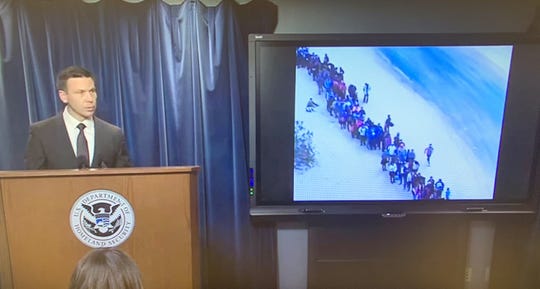
The Chief of US Border Police Asserts That the System Has Collapsed Due to the Wave of Migrants
(Spain) on 27 March 2019
by Antonia Laborde (link to original)
The CBP said that, at this rate, March will end with 100,000 detentions: "March will be the highest month since 2008," said McAleenan. The profile of detained migrants, he then explained, is mainly (65 percent) families with children that simply turn themselves in to agents, while the rest are adults on their own that intend to evade apprehension, and “within that flow are thousands of criminals." The number of families without papers that arrive at the border has broken various records in recent months, but the number of migrants that cross the Mexican border illegally is far from its maximum two decades ago.
The CBP's claim arrives mere weeks after President Donald Trump declared a national emergency at the border, alleging a drug and illegal immigration crisis. The desperate move from the Republican − which Congress tried to reverse, without success − allows him to use his special powers to allocate public funds that he needs to construct the wall along Mexico. The commissioner McAleenan, feeding Trumpist discourse, blamed the "crisis" on smugglers and U.S. laws that, in his opinion, foster illegal immigration, since it is "almost guaranteed that they will be released … in the U.S." Border agents contend that El Paso is going through the most dangerous overcrowding situation, with detention centers occupied at 300 percent or 400 percent of capacity.
The CBP commissioner expressed his fear that this situation would bring about a tragedy in a detention center. "We are doing everything we can to simply avoid a tragedy ... but with these numbers, with the types of illnesses we're seeing at the border, I fear that it's just a matter of time," warned the agent. Last December two Guatemalan minors died in U.S. government custody.
If in February the parameters were already shattered with more than 76,000 foreigners who crossed the border irregularly − the highest monthly rate in 12 years − the agents promised an even worse March. The change in the profile of who is arriving has contributed to the "collapse." In the past those who crossed the border without papers were Mexicans who came alone and could be deported easily to their country. The fact that now they are predominantly Central American families in search of asylum and, by law, should be dealt with in court, is what is obstructing the system that is not prepared to serve such a high demand. The applicants' legal processes can take months or even years. The customs office remarked this Wednesday that only between 10 and 15 percent of cases are legitimate asylum applications.
Last year the Trump administration approved various reforms to reduce the number of migrants who can pass the first screening for asylum applications, thus avoiding starting a legal process. For example, since June 2018, the condition of domestic violence victims or the threat of gangs in the country of an applicant's origin are no longer in and of themselves sufficient reasons to seek protection. But that has not impeded migrants fleeing violence from continuing to arrive at the border.
The CBP said that, at this rate, March will end with 100,000 detentions: "March will be the highest month since 2008," said McAleenan. [https://www.wcpo.com/news/national/almost-40-000-children-will-be-taken-into-federal-custody-this-month-us-border-official-says] The profile of detained migrants, he then explained, are mainly (65 percent) families with children that simply turn themselves in to agents, while the rest are adults on their own that intend to evade apprehension, and “within that flow are thousands of criminals." [https://kfoxtv.com/news/local/cbp-commissioner-to-address-increase-in-illegal-crossings-along-southwest-border] The number of families without papers that arrive at the border has broken various records in recent months, but the number of migrants that cross the Mexican border illegally is far from its maximum two decades ago.
The CBP's claim arrives mere weeks after President Donald Trump declared a national emergency at the border, alleging a drug and illegal immigration crisis. The desperate move from the Republican − which Congress tried to reverse, without success − allows him to use his special powers to allocate public funds that he needs to construct the wall along Mexico. The commissioner McAleenan, feeding Trumpist discourse, blamed the "crisis" on smugglers and U.S. laws that, in his opinion, foster illegal immigration, since it is "almost guaranteed that they will be released … in the U.S." [https://www.breitbart.com/politics/2019/03/27/u-s-border-at-breaking-point-says-border-protection-chief/] Border agents contend that El Paso is going through the most dangerous overcrowding situation, with detention centers occupied at 300 percent or 400 percent over capacity.
The Border Patrol commissioner expressed his fear that this situation would bring about a tragedy in a detention center. "We are doing everything we can to simply avoid a tragedy ... but with these numbers, with the types of illnesses we're seeing at the border, I fear that it's just a matter of time," warned the agent. [https://www.npr.org/2019/03/27/707297404/immigration-system-at-the-breaking-point-homeland-security-official-warns] Last December two Guatemalan minors died in U.S. government custody.
If in February the parameters were already shattered with more than 76,000 foreigners who crossed the border irregularly − the highest monthly rate in 12 years − the agents promised an even worse March. The change in the profile of who is arriving has contributed to the "collapse." In the past those who crossed the border without papers were Mexicans who came alone and could be deported easily to their country. The fact that now they are predominantly Central American families in search of asylum and, by law, should be dealt with in court, is what is obstructing the system that is not prepared to serve such a high demand. The applicants' legal process can take months or even years. The customs office remarked this Wednesday that only between 10 and 15 percent of cases are legitimate asylum applications.
Last year the Trump administration approved various reforms to reduce the number of migrants who can pass the first screening of asylum applications, thus avoiding starting a legal process. For example, since June of 2018, the condition of domestic violence victims or the threat of gangs in the country of the applicant's origin are no longer by themselves sufficient reasons to seek protection. But that has not impeded migrants fleeing violence from continuing to arrive at the border.


